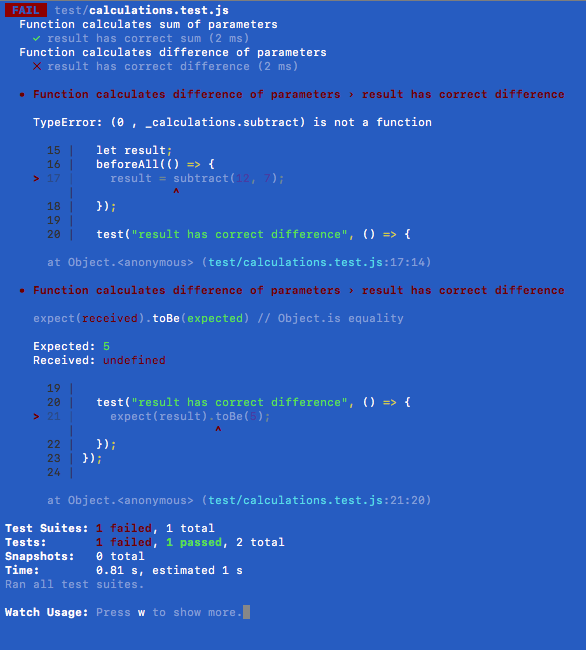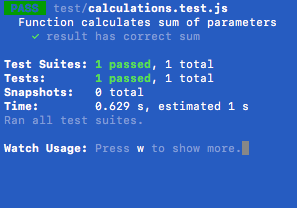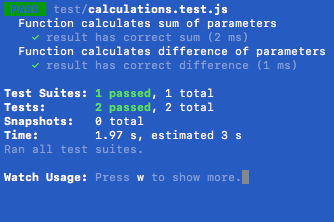as per Wikipedia:
Unit tests are typically automated tests written and run by software developers to ensure that a section of an application (known as the "unit") meets its design and behaves as intended.
In procedural programming, a unit could be an entire module, but it is more commonly an individual function or procedure. In object-oriented programming, a unit is often an entire interface, such as a class, but could be an individual method.
By writing tests first for the smallest testable units, then the compound behaviors between those, one can build up comprehensive tests for complex applications.
In their own words:
"Jest is a delightful JavaScript Testing Framework with a focus on simplicity."
Want more info? Go to the Jest docs
TWO WAYS TO USE THIS REPO:
-
clone it, run npm install, run the tests - inspect the code and add more code to test
-
DIY setup - full walkthrough of npm init and Jest install, customizing environment
- In your workspace directory, create a new project directory:
mkdir Testing-Exercises - Navigate to your new project directory:
cd Testing-Exercises - Initialize project directory to track npm packages:
npm init
- package name: ( press enter or return )
- version: ( press enter or return )
- description: ( press enter or return )
- entry point: ( press enter or return )
- test command:
jest --verbose --watchAll - git repository: ( press enter or return )
- keywords: ( press enter or return )
- author: ( press enter or return )
- license: (ISC) ( press enter or return )
- Install testing framework and dependencies:
npm install --save-dev jest babel-jest puppeteer @babel/core @babel/plugin-transform-modules-commonjs - Launch VS Code from your project's root directory and add the following code to your
package.jsonfile (after main/before scripts):
"directories": {
"test": "test"
},
- Create a
.babelrcfile in your project's root directory and paste the following code:
{
"env": {
"test": {
"plugins": [
"@babel/plugin-transform-modules-commonjs"
]
}
}
}
- Initialize directory for version control:
git init - Create
.gitignoreand add files/directories to ignore:echo -e ".DS_Store\nnode_modules" >> .gitignore - create
testdirectory:mkdir test - create
srcdirectory:mkdir src - create a
scriptsdirectory insrc:mkdir src/scripts
This is a great time to add and commit your work, make a GitHub repository, connect to your local repository, and push your work.
Unit Testing - writing tests for existing code
- Let's remember our git flow and make a new branch
- create
calculations.jsfile inside scripts directory - In
calculations.js, copy and paste the following code which is a function that returns the sum of two parameters:
export const add = (num1, num2) => {
return num1 + num2;
};
- Make a new file called
calculations.test.jsfile in thetestdirectory - In
calculations.test.js, paste the following code which tests theaddfunction incalculations.js
import { add } from "../src/scripts/calculations.js";
let result;
describe("Function calculates sum of parameters", () => {
beforeAll(() => {
result = add(1, 2);
});
test("result has correct sum", () => {
expect(result).toBe(3);
});
});
-
Back in your terminal, open a new tab in the project root directory, and start your test suite:
npm run test. You can leave this process running. Jest automatically runs the test suite every time you make changes to your code. -
Check the test results in the terminal.
Jest will give you a detailed output of which tests were run and whether they passed or not.
-
This is a great time to keep those git skills fresh. You know what to do.
Test-Driven Development explanation or link here
- In
calculations.js, paste the following code which tests a function calledsubtractwhich returns the difference of two parameters.
(The code we're testing doesn't actually exist yet... so the test will automatically fail.)
describe("Function calculates difference of parameters", () => {
let result;
beforeAll(() => {
result = subtract(12, 7);
});
test("result has correct difference", () => {
expect(result).toBe(5);
});
});
- We will also need to update the import statement in
calculations.js
import { add, subtract } from "../src/scripts/calculations.js";
-
Run the test suite - watch the new test fail

Notice how Jest will tell you exactly where your test has failed. In this case, the test has failed and gives a
TypeError: (0 , \_calculations.subtract) is not a functionThis basically means either subtract doesn't exist or it does and it is not a function. More info here: TypeError: "x" is not a function
-
Now we need to write some code that will pass the test. If you look at the test we wrote, we are expecting to test a function named
subtractwhich returns the difference of the two parameters. Paste the following code intocalculations.js
export const subtract = (num1, num2) => {
return num1 - num2;
};
Ideas for things to test:
- write some more calculation functions; e.g. multiply, divide, etc.
- filtering arrays
- keys/values on an object
- convert an object into an HTML string representation

